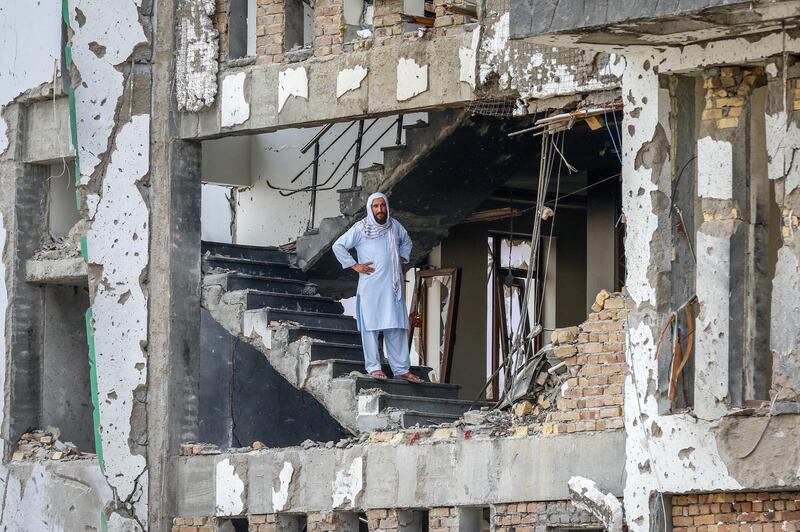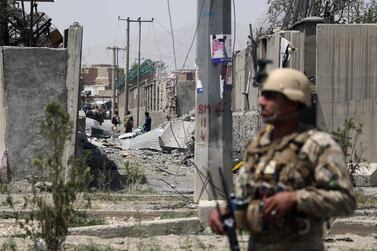Worsening violence and threats against campaign rallies have left Afghans fearful of heading to the polls next month for the presidential election.
The official campaign season started on July 28, but was immediately beset by deadly violence when President Ashraf Ghani's running mate Amrullah Saleh was targeted in an attack in Kabul that killed at least 20 people. Mr Saleh, a former spy chief turned vice presidential candidate known for his fierce anti-Taliban stance, was unharmed, but the violence led opposition candidate Hanif Atmar to pull out.
In a statement issued on Tuesday, the Taliban called the September 28 elections a “deceiving process” and a “theatrical and a sham”, announcing that they intended to target campaign rallies. They urged civilians to "stay away from gatherings and rallies that could become potential targets”.
“As the coming election is akin to the previous misleading processes, the Islamic Emirate (the name the Taliban refer to themselves by) shall exert the utmost effort to prevent it,” their statement read, calling on Afghans to boycott the election.
The Taliban believe the elections and the results are controlled by the occupying foreign forces and as a result are a "ploy to deceive the common people". Multiple Taliban attacks in the capital Kabul in recent weeks have left Afghans fearful of voting.
“I participated in the first elections (in 2004) and none after that,” said Fida Mohammad, 33, a pharmacist from Kunduz province, which is regularly targeted by the Taliban.
“I don’t have any faith on the electoral system in Afghanistan. Only the candidates who agree to accept the terms of the US administration will come to power. We saw that last time and his is how it will be again,” he said, referring to a dispute during the 2014 presidential elections that led to a US-brokered power-sharing deal between the leading rival candidates, President Ghani and Dr Abdullah Abdullah.
Mr Mohammad will not vote in the coming election. “It’s too risky. The Taliban are talking about peace and killing Afghans at the same time,” he said.
Almost 200 members of his extended family plan to stay away from the elections.
“The Taliban are controlled by external powers (Pakistan) and I don’t trust them at all.
“I don’t allow my 10-year-old son out of the house to play. I have to explain to him how the situation is dangerous in the city. So then why would I let a loved one to go to election centres, which are a target?”
Samira Hamidi, regional campaigner at Amnesty International, said the Taliban’s threats run counter to their claims that they want to further peace in the country. “While [the Taliban] live in seven-star hotels in Doha and claim they want an end to bloodshed, their action is completely the opposite,” she said, adding that the targeting of campaign rallies is a clear violation of people’s rights to peaceful assembly and freedom of expression.
Ms Hamidi said Amnesty remain deeply concerned about the possibility of more civilian casualties as the elections draw near.
“Afghanistan is extremely unstable and shaky. It is very difficult to believe that election day will be violence free. It has not been in the past,” she said.
The United Nations has also expressed concern over the Taliban’s threat.
“The electoral process in Afghanistan is a civilian undertaking and everyone has the right to take part in public affairs, to vote and to be elected to government without discrimination and without unreasonable restrictions,” they said in a statement issued on Tuesday. They urged the group to “respect and protect civilians”, saying that attacks directed at polling stations and voters are clear violations of international law, and “perpetrators of such crimes must be held accountable”.
There are those who remain undeterred, however. Basir Mohammad, a senior member of Afghan Green Trend, Mr Saleh's political party, told The National: "We continue to see large turnouts at the rallies despite threats from the Taliban. It seems to me that people are determined to respond to the Taliban by saying no."
“We lost a lot of colleagues and volunteers [in the recent Taliban attack], but we have not seen a dip in morale. This is our way of rejecting the Taliban and Pakistan, who control it.”
Afghan Green Trend are taking extra precautions since the threats to ensure civilian safety. “We have increased security at these events but are careful about not announcing the time and date of the rallies much in advance – the Taliban takes about two days or more to plan their attacks, so we don’t announce our events until the last minute and we still see large crowds,” said Mr Mohammad.
Mr Mohammad also said he is confident that the voter turnout will be the same, if not higher, than the parliamentary elections last year, when turnout was close to 45 per cent.
“This is not the first time the Taliban have threatened Afghans, they have been doing that for the last 17 years. By continuing and persisting with the elections, we will show them that we stand united against their extremism,” he said.






